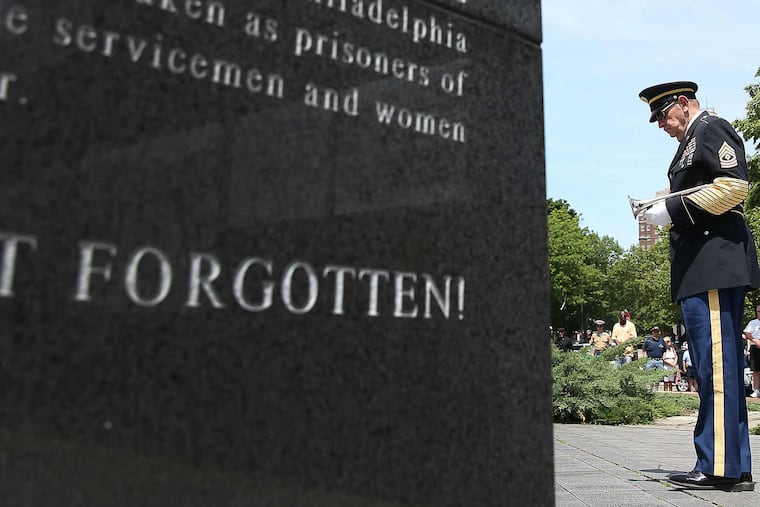During the Korean War, a Christmas miracle
"The greatest rescue operation by a single ship in the history of mankind." - U.S. Maritime Administration By Chris Gibbons

"The greatest rescue operation by a single ship in the history of mankind."
- U.S. Maritime
Administration
By Chris Gibbons
On Dec. 22, 1950, Capt. Leonard LaRue, of Philadelphia, peered through his binoculars from the deck of his merchant cargo vessel, SS Meredith Victory, as it approached the besieged North Korean port of Hungnam.
LaRue could see thousands of shivering refugees lining the harbor in a desperate attempt to escape the marauding Communist Chinese and North Korean soldiers who surrounded, and were quickly closing in on, the city.
"It was a scene of 'Dante's Inferno,'" LaRue would later recall. In the book, Ship of Miracles, by Bill Gilbert, LaRue remembered that "Korean refugees thronged the docks. With them was everything they could wheel, carry, or drag. Beside them, like frightened chicks, were their children." Rumors were swirling that the Communists were executing fleeing refugees for "collaborating" with the American soldiers.
U.S. Navy gunships fired at the enemy on the city's outskirts, shuddering the harbor with each salvo. Smoke billowed into the overcast skies as elements of the 3rd Infantry Division fought to save the now encircled Hungnam. Outnumbered but undaunted, the brave Americans were desperately trying to buy time for the evacuation of the frightened refugees.
Just a few days prior, LaRue, a Merchant Marine captain who had been employed by the Navy to carry supplies for U.S. servicemen during the initial months of the Korean War, met on board his ship with U.S. Army officers who revealed their plans for a "Dunkirk-like" rescue of the refugees. Staff officer J. Robert Lunney recounted the scene in Ship of Miracles. "We can't order you to take them," one of the colonels said, "but we ask if you would volunteer." Lunney remembers that LaRue didn't hesitate: "He neither turned to his left or right, nor conferred with anyone. He responded that he would take his ship in and take off as many refugees as he could."
Code named "Christmas Cargo" by the military, and now commonly referred to as the "Christmas Miracle," the incredible evacuation at Hungnam by military transports and merchant ships resulted in the rescue of nearly 200,000 troops and civilian refugees. But it's the forgotten story of the S.S. Meredith Victory that truly defines the miracle.
As chronicled in Ship of Miracles, the Meredith was designed to haul cargo and only had accommodations for 12 passengers and a 47-person crew. On the afternoon of Dec. 22, in gale force winds and swirling snow, the crew began to load the refugees into the cargo holds using makeshift booms and gangplanks.
First mate Dino Savastio recalled that "the temperature was well below freezing, but the holds were not heated or lighted. There were no sanitary facilities for them . . . children carried children, mothers breast-fed their babies with another child strapped to their backs, old men carried children. . . . I saw terror in their faces."
It took nearly 24 hours, but the crew somehow managed to fit 14,000 refugees within the ship's five cargo holds. The Meredith finally departed Hungnam on Dec. 23. After a harrowing two days in mine-infested waters patrolled by enemy submarines, the ship safely arrived at Koje Do Island on Christmas Day. Not only did all of the refugees survive, but five babies were born during the journey.
LaRue and his crew would receive citations from the U.S. and South Korean governments. In 1954, LaRue joined the Benedictine monastery at St. Paul's Abbey in Newton, N.J. He was known as "Brother Marinus," and lived there until his death in 2001. When asked about the Christmas Miracle many years later, LaRue said, "I was always somewhat religious, even in my youth in Philadelphia. . . . I think often of that voyage . . . and as I think, the clear, unmistakable message comes to me that on that Christmastide, in the bleak and bitter waters off the shores of Korea, God's own hand was at the helm of my ship."
On the 65th anniversary of that miracle, the United States again faces a refugee crisis wrought by war. The situations are very different, but the courageous actions our country has taken on behalf of refugees in the past has set a high bar. Like it or not, the world looks to the United States to lead in a crisis.
As I look back on what the brave men of the Meredith Victory accomplished in 1950, I sadly recognize just how much our country has changed. While many will read this story and marvel at how the lives of 14,000 refugees were miraculously saved, others will conclude that the real miracle was that LaRue and his crew volunteered to do it at all.
Chris Gibbons is a Philadelphia writer. gibbonscg@aol.com